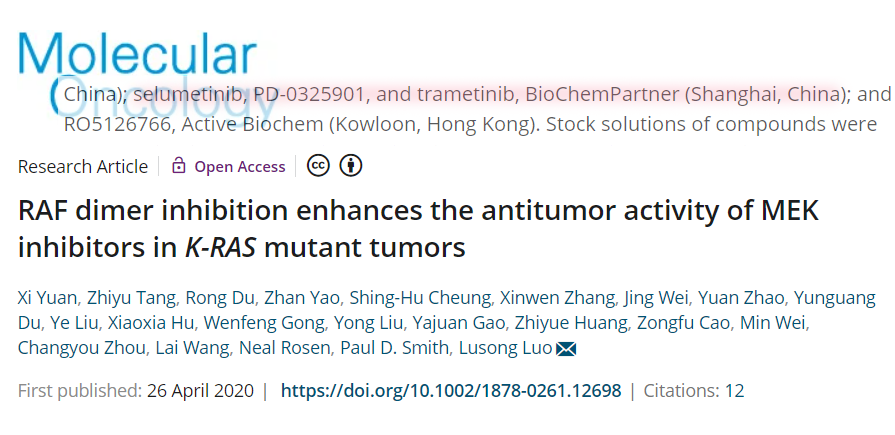RAF dimer inhibition enhances the antitumor activity of MEK inhibitors in K‐RAS mutant tumors

Abstract The mutation of K-RAS represents one of the most frequent genetic alterations in cancer. Targeting of downstream effectors of RAS, including of MEK and ERK, has limited clinical success in cancer patients with K-RAS mutations. The reduced sensitivity of K-RAS-mutated cells to certain MEK inhibitors (MEKi) is associated with the feedback phosphorylation of MEK by C-RAF and with the reactivation of mitogen-activated protein kinase (MAPK) signaling. Here, we report that the RAF dimer inhibitors lifirafenib (BGB-283) and compound C show a strong synergistic effect with MEKi, including mirdametinib (PD-0325901) and selumetinib, in suppressing the proliferation of K-RAS-mutated non-small-cell lung cancer and colorectal cancer (CRC) cell lines. This synergistic effect was not observed with the B-RAFV600E selective inhibitor vemurafenib. Our mechanistic analysis revealed that RAF dimer inhibition suppresses RAF-dependent MEK reactivation and leads to the sustained inhibition of MAPK signaling in K-RAS-mutated cells. This synergistic effect was also observed in several K-RAS mutant mouse xenograft models. A pharmacodynamic analysis supported a role for the synergistic phospho-ERK blockade in enhancing the antitumor activity observed in the K-RAS mutant models. These findings support a vertical inhibition strategy in which RAF dimer and MEKi are combined to target K-RAS-mutated cancers, and have led to a Phase 1b/2 combination therapy study of lifirafenib and mirdametinib in solid tumor patients with K-RAS mutations and other MAPK pathway aberrations.




